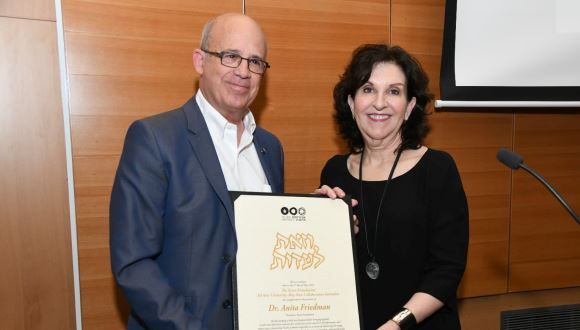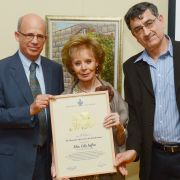BOG 2018: Israel-US Research Ties Ramped-Up Through New Initiative
In a festive ceremony held at the filled-to-capacity Raya and Josef Jaglom Auditorium, the Koret Foundation Tel Aviv University–Bay Area Collaborative Initiative was launched in the presence of Dr. Anita Friedman, President of the Koret Foundation; Prof. Ron Shamir, Head of the bioinformatics component of the Initiative; Prof. Irad Ben-Gal, Head of the smart cities component; TAU President Prof. Joseph Klafter and other dignitaries and senior TAU officials.
The Initiative will bring together Tel Aviv University researchers in smart cities and in bioinformatics with colleagues at Stanford and Berkeley respectively. Its mission: To facilitate a robust synergy and cross-fertilization of ideas among American and Israeli researchers over the coming five years, with a view to advancing R&D that could lead to economic growth, better business practices, personalized medicine and enhanced quality of life.
At the ceremony, President Klafter expressed his gratitude. “I’d like to warmly thank Dr. Anita Friedman, President of the Koret Foundation and the Koret Foundation trustees, longstanding supporters of TAU, for their vision and generosity. He spoke of the importance of the Initiative for the Israeli-American relationship in general, and for TAU-Bay Area ties in particular, which “dovetails with TAU’s mission to build bridges with countries around the world through research and teaching.” Warmer relations with US universities will also serve to counter attempts to isolate Israel academically, and “and to help build up Israel’s international standing and reputation as a force for good,” he continued.
“We should be thanking you,” Dr. Friedman replied. “When we took a look at who and what is moving the world forward in the right direction – a better direction – we found Tel Aviv University. We are very honored to be in partnership with you.”
Multidisciplinary meeting of academic giants
In the framework of the two-pronged Koret Initiative, researchers from TAU and Berkeley will pursue joint research on bioinformatics, while TAU and Stanford researchers will work together on research in smart cities and digital living. Funding will support research grants; joint conferences, workshops and seminars; summer programs; and a visiting scientist program. Funding has been committed by the Koret Foundation for a five-year period.
Prof. Ron Shamir, laureate of the 2017 Kadar Family Award for Outstanding Research, will lead the bioinformatics component of the Initiative under the auspices of TAU’s Edmond J. Safra Center for Bioinformatics, which he also heads. The Safra Center comprises 31 research groups, 10 affiliated groups, 90 graduate students, and 15 alumni academic positions in Israel and overseas. The goal: to develop computational tools to enhance human health using big data. “We are on the cusp of precision medicine,” stated Prof. Shamir. “The tools we develop in the framework of this Initiative will help make this a reality.” He welcomed ceremony attendees including two representatives of the Edmund J. Safra Foundation.
“The Koret Initiative is building on two strong centers – the Center for Computational Biology at Berkeley and the Safra Center here – which offer complementary expertise and synergy,” said Prof. Shamir. According to Microsoft Rankings in computational biology, TAU ranks 11th in the world – the only one outside of the US – and Berkeley ranks 5th. Shamir emphasized that TAU and Berkeley already have close ties, which will be significantly deepened through the Initiative.
Head of the smart cities component, Prof. Irad Ben-Gal of TAU’s Department of Industrial Engineering, gave a brief presentation on the importance of the Initiative and the two seemingly very different components it supports – bioinformatics and smart cities. “But actually, the projects have a lot in common,” he said. “They both involve information embedded in a sequence of data – whether for health or for smart cities – that we need to understand and optimize.”
Ben-Gal continued, “This is a unique project – instead of each of us focusing on our own regular research, we all took a step back and took a fundamental look at how we’ll all be living in 15 years from now.” He predicted that 70% of us will be living in cities with outdated infrastructures that will pose major challenges in transportation, energy consumption and other spheres. “This is why the Initiative is so important – to generate better solutions for how we live, work, consume and more,” he continued.
The ceremony concluded with presentations by students in related fields: Tal Geller, a master’s student of business analytics at the Department of Industrial Engineering, spoke on remote medicine and Maoz Gelbart, an accelerated track PhD student in biotechnology and former Safra Fellow for Excellence, spoke on the evolution of HIV.
The Initiative was announced in San Francisco in signing ceremonies at both institutions in March 2018.






